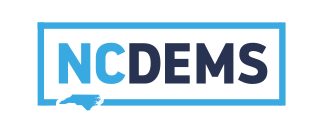
Scouting in North Carolina has a long history, from the 1910s to the present day, serving thousands of youth in programs that suit the environment in which they live.

The North Carolina Democratic Party (NCDP) is the North Carolina affiliate of the Democratic Party. It is headquartered in the historic Goodwin House, located in Raleigh.

Members of the North Carolina General Assembly of 1899–1900 were elected in November 1898. The election saw the Democratic Party return to majority status in both houses, replacing the fusion of Republicans and Populists. After this election, Democrats dominated state politics for the next seventy-plus years, in part due to the 1899–1900 legislature disfranchising African-Americans. The election followed the 1898 Wilmington massacre.
The North Carolina State Bureau of Investigation (SBI) is a state-level law enforcement agency in North Carolina.

The North Carolina General Assembly of 2007–08 consisted of the North Carolina House of Representatives and the North Carolina Senate that met in Raleigh, North Carolina, in 2007 and 2008. Members of the House and Senate were elected on November 7, 2006. This legislature first convened in January 2007. In addition to its regular sessions, the legislature met in special session in March 2008 to consider expelling Representative Thomas E. Wright.

The following outline is provided as an overview of and topical guide to the U.S. state of North Carolina. Wikipedia:WikiProject North Carolina Category:Top-importance North Carolina articles are indicated.
The North Carolina Heritage Award is an award given out by the North Carolina Arts Council, an agency of the North Carolina Department of Natural and Cultural Resources, in recognition of traditional artists from the U.S. state of North Carolina. The award was created in 1989.

The North Carolina General Assembly 2009–10 was the 149th North Carolina General Assembly. The 50 members of the North Carolina Senate and 120 members of the North Carolina House of Representatives were elected on November 6, 2008. It first convened in January 2009.

The 1980 United States presidential election in North Carolina took place on November 4, 1980, as part of the 1980 United States presidential election. Voters chose 13 representatives, or electors to the Electoral College, who voted for president and vice president.

The 1976 United States presidential election in North Carolina took place on November 2, 1976, and was part of the 1976 United States presidential election. Voters chose 13 representatives, or electors to the Electoral College, who voted for president and vice president.
The North Carolina Department of Juvenile Justice and Delinquency Prevention (DJJDP) was a state agency of North Carolina, headquartered in Raleigh. The agency operates juvenile corrections facilities in the state. It is now a part of the North Carolina Department of Public Safety.

The 1968 United States presidential election in North Carolina took place on November 5, 1968, and was part of the 1968 United States presidential election. Voters chose 13 representatives, or electors to the Electoral College, who voted for president and vice president.

An election was held on November 8, 2022, to elect all 50 members to North Carolina's Senate. The election coincided with the elections for other offices, including the U.S. Senate, U.S. House of Representatives, and state house. The filing period lasted from February 24, 2022, to March 4, 2022, with the primary election being held on May 17, 2022. The elections were originally to be held under new districts passed by the General Assembly in Senate Bill 739 to account for population changes following the 2020 census; however, following a ruling by the North Carolina Supreme Court, the General Assembly redrew the maps to comply with the court's ruling.

The 2024 North Carolina Senate election will be held on November 5, 2024, to elect all 50 members to North Carolina's Senate. The election will coincide with elections for other offices, including for the U.S. President, U.S. House of Representatives, Governor, Lieutenant Governor, Attorney General, and state house. The primary election was held on March 5, 2024. Ahead of the election, districts were redrawn and passed the General Assembly in Senate Bill 758.

The 2024 North Carolina House of Representatives election will be held on November 5, 2024, to elect all 120 members to North Carolina's House of Representatives. The election will coincide with elections for other offices, including for U.S. President, U.S. House of Representatives, Governor, Lieutenant Governor, Attorney General, and state senate. The primary election will be held on March 5, 2024. Ahead of the election, districts were redrawn and passed the General Assembly in House Bill 898.










